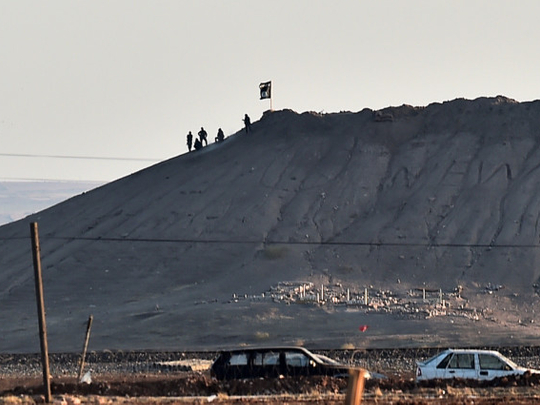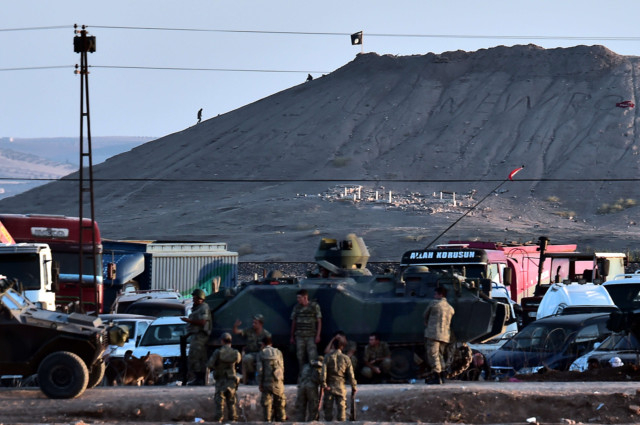
Istanbul: Daesh militants pushed on Monday into the eastern edge of the Syrian Kurdish town of Kobani on the Turkish border, after sustained shelling that drove back the Kurdish fighters and Syrian insurgents fighting alongside them, killing 16 and raising fears of a massacre of civilians, Kurdish fighters and activists said.
Anwar Muslim, a coordinator in Kobani for the People’s Protection Committees, a Kurdish militant group known as the YPG, said late on Monday that 12,000 civilians were trapped inside the town.
He said that his group was running out of heavy ammunition, and with militants from Daesh, formerly termed as the Islamic State of Iraq and Levant, close by the population was in constant fear of car bombs or suicide bombers.
Rooz Bahjat, who identified himself as a senior security official with the Kurdistan Regional Government in Iraq, said that as many as 9,000 militants were closing in on the area, leaving other fronts in eastern and northern Syria and even as far away as Iraq to attack what he called “a bastion of democracy and secularism” in Kobani, which has given shelter to internally displaced Syrians from a wide range of ethnic groups.
“The whole might of Daesh right now is turned onto Kobani,” he said.
His information could not be independently verified, but Kurdish officials have been warning for days that without more military aid, Kobani will fall. And Daesh fighters in Raqqa and Aleppo provinces have said in recent interviews that they were redeploying toward Kobani after having faced US-led airstrikes in their strongholds elsewhere in Syria.
The Kurdish militants have been hanging on as fighters from the Daesh have advanced with heavy weapons in a three-week assault. Kurdish women have joined the battle, and one, Kurdish and Syrian activists say, blew herself up with a grenade over the weekend rather than be captured.
Shells have sailed across the Turkish border several times in recent days, and on Monday a black Daesh flag appeared to be flying from one of the taller buildings in Kobani or Ayn Al Arab as it is known in Arabic, the main settlement in a group of Kurdish farming villages that has been under assault since mid-September.
Video from the front lines in recent days has shown fighters for the Daesh advancing across fields in formation, well equipped in camouflage flak vests. Some militants have posted pictures of themselves holding the severed heads of what they say are female Kurdish fighters.
The Kurds are cut off from supply lines and surrounded by Daesh fighters on three sides. The fourth, the Turkish border, is heavily guarded by Turkish forces, which have prevented Turkish and Syrian Kurds from joining the fight.
Turkish army patrols watching from across a border fence have remained spectators to the fighting, even though on Monday the Nato alliance said it would aid Turkey, a member state, if it came under attack.
“Turkey should know that Nato will be there if there is any spillover, any attacks on Turkey as a consequence of the violence we see in Syria,” Jens Stoltenberg, the secretary-general of the alliance, said on Monday.
Turkish officials have said they will assist in the fight against the Daesh, but given Turkey’s open border policy that long facilitated the movement of the extremist militants into Syria, Kurds are suspicious of its intentions. They say that Turkey views the semi-autonomous Kurdish region that has developed on the Syrian side of the border as the greater threat.
Turkey’s prime minister, Ahmet Davutoglu, told CNN on Monday that Turkey was ready to take many military measures, including sending ground troops to Syria, but that there needed to be “a clear strategy.” Turkish officials were disappointed that President Barack Obama did not make the ouster of President Bashar Al Assad of Syria a goal of the operation against the Daesh, and have demanded an internationally backed no-fly zone to keep Syrian jets out of the air before taking new military action. Airstrikes by the US-led coalition against the Daesh took out two of the group’s positions south of Kobani on Monday, the US military said. But as Kurdish fighters pleaded for more support, the only other airstrikes on the militant group Monday were conducted elsewhere, in Raqqa and Deir Al Zour provinces.
Syrian insurgents opposed to the Daesh have vowed to step up cooperation with the YPG, but the Syrians do not have a strong presence in the area.
The Turkish government was initially reluctant to take strong action against the Daesh after it overran Mosul and large areas of northern Iraq in August, citing the need to safeguard 46 Turkish hostages being held by the militant group. But the hostages were freed last month in a deal that has raised further questions about the relationship between Turkey and the Daesh.
The BBC on Monday quoted unidentified security sources as saying the hostages were freed in a large prisoner exchange in which around 180 jihadists who had been held in Turkish custody, possibly including two Britons, were handed over to the Daesh.
Turkish officials have neither confirmed nor denied the report, but on Monday a senior party official said such a deal would not have been unreasonable.
“We might have swapped thousands when lives of our nationals were at stake,” said a governing party official, who asked not to be identified because he was discussing a confidential national security matter.
Elsewhere across Syria, insurgents struck on two fronts against government forces.
North of Aleppo, insurgent groups including the Al-Qaida-affiliated Nusra Front and the US-backed Harakat Hazm fought government forces that recently seized the town of Handarat.
Fighters from Hazm, which has been supplied with US-made TOW antitank weapons, have destroyed government tanks in recent days, rebels say. Rebel spokesmen on Monday said they were pushing hard to take back the town of Handarat and had captured foreigners, including Afghans and Lebanese, fighting on the government side.
In an unusual battle near the border with the Golan Heights in southern Syria, another US-backed group, the Omari Brigades of the Syrian Revolutionaries Front, took a government air defense base on the hilltop of Tel Al Harrah and posted a video of several fighters with what they said was Russian-made government air defense equipment.
A covert US effort to equip and train relatively moderate insurgents there has had few major successes. More aid has been promised to groups deemed moderate by US officials as part of the campaign against the Islamic State. But it was unclear whether the recent victory was because of new equipment or organization, or if it benefited from recent victories in the area by the Nusra Front.













